Key takeaways
- Corporate-startup collaboration accelerates innovation by giving corporates access to disruptive technologies, agile business models, and new market insights.
- Collaborations help corporates future-proof their business, boost revenue, speed up go-to-market strategies, and build entrepreneurial culture.
- Successful collaborations require clear alignment with corporate strategy, defined value spaces, and mutually beneficial engagement models.
- Choosing the right collaboration model, whether accelerators, venture client units, CVCs, or hybrid hubs, is critical for success.
- Common challenges include process mismatches, cultural differences, and integration hurdles, which can be mitigated with structured governance and leadership buy-in.
- Strategic collaborations typically deliver results over a 2–5 year horizon, making patience and a long-term outlook essential.
In today’s competitive landscape, being the first to seize new growth opportunities (i.e. adopting a new technology or business model or putting out a new offering) can make or break a business. However, the speed needed to thrive can be a challenge in corporate settings, which tend to operate under strict rules and regulations.
The result? Many game-changing concepts and ideas end up not moving past the proverbial drawing board.
In response, corporations worldwide are partnering with startups to tap into disruptive ideas, innovative business models, and cutting-edge technologies with unprecedented speed and reduced risk.
- 1 in 6 startup deals now involve corporates (3× more than 10 years ago)
- Corporate-backed funding hit $133B, up 20% last year
- 80% of corporates are active in corporate venturing
To give you a better understanding of how these startup partnerships work in practice, we’ve listed 11 key steps to help you spot, attract and engage with cutting-edge startups that align with your organisation's long-term growth goals and vision.
But first, let’s kick things off with some context.
What is a corporate-startup collaboration?
Corporate-startup collaboration is a strategic partnership where corporations team up with startups to accelerate innovation, access disruptive technologies, and drive growth. It’s a give-and-take relationship that involves pooling resources, expertise, assets, and capabilities to achieve shared business objectives (e.g. growth, new revenue sources, etc.).
Each side brings valuable resources to the table:
- Startups provide corporates with access to cutting-edge technologies, business models, and innovative concepts.
- Corporates provide startups with the funding and resources they need to scale their growth fast.
It’s a winning combination that enables both sides to reach their specific growth goals with higher agility and less risk than they would on their own. By tapping into the external startup ecosystem, corporations can future-proof their business, diversify revenue, and stay ahead in today’s unpredictable landscape. Each new venture acts like a sounding board to validate new technologies, models, products and services fast and in small, controlled environments.
What are the benefits of corporate-startup partnerships?
We’ve already touched on some of the key benefits of corporate-startup collaborations, but here are a few more specific examples:
1. They enable corporations to discover and expand into new markets
Startups operate at the forefront of emerging trends and consumer preferences. Corporations can tap into this knowledge and leverage it to gain a competitive edge and create new revenue.
2. They facilitate new value propositions, leading to a pipeline of new offerings
Startups can help corporations rapidly prototype and test new ideas and bring them to market faster than traditional corporate product development cycles.
3. They allow companies to commercialise their industry know-how
By collaborating with startups, corporations can leverage their existing assets to co-create innovative solutions that can lead to new growth and revenue.
4. They speed up time to market and make the venturing process leaner
Startups are nimble and agile, allowing them to test and iterate new products or business models quickly. Corporations can leverage this lean approach to explore new markets or business models with less risk.
5. They foster a more innovative corporate culture
Startup practices can challenge traditional corporate processes, inspiring employees to think outside the box and take risks, thus fostering a culture of entrepreneurship.
6. They enable companies to attract new entrepreneurial talent
By collaborating with startups, corporations create opportunities for employees to engage in groundbreaking projects (e.g. launching a new offering, leveraging a new technology, etc.). This environment attracts talent with an entrepreneurial mindset.
What types of corporate-startup collaborations are there?
There are various types of corporate-startup collaboration models, ranging from traditional approaches like accelerators and CVCs to more innovative approaches like sandboxing and subscription models. In recent years, we’ve even seen the rise of newly emerging models, like drop studios and influencer incubators.
These latest models reflect our dynamic innovation landscape, fueled by disruptive tech advances and shifting customer demand - and they’re enabling innovators and entrepreneurs to bring offerings to the market in groundbreaking and impactful ways.
Here are just a few examples of some of the most commonly used corporate-startup collaboration models:
Accelerators
Accelerators provide startups with mentorship, business support, funding, and connections to investors and potential partners. They’re an ideal fit for startups with a promising MVP, looking to rapidly scale their growth.
Example: Disney Accelerator

The Disney Accelerator is a corporate accelerator program operated by The Walt Disney Company. Launched in 2014, the program focuses on nurturing innovative startups in the media, entertainment, and technology sectors. Selected startups receive mentorship, resources, and investment from Disney, as well as access to Disney's extensive network of executives, creative leaders, and subject matter experts.
Ecosystem facilitators
Ecosystem facilitators leverage open collaboration to bring new propositions to the market. They’re usually built as a knowledge hub around a specific theme and are comprised of entrepreneurs, corporations, investors, public entities, and/or communities.
Example: Plug and Play

Plug and Play helps leading corporations innovate by giving them access to startups that can help them further their growth goals. Their aim is to build a one-of-a-kind ecosystem that connects innovators with leading organisations to create the technologies of the future.
Venture client unit
Venture client units enable corporations to become early adopters of a startup’s product or service (before it reaches market maturity), feeding its growth and enabling it to improve its offering by providing valuable user feedback.
Example: BMW Startup Garage

BMW Startup Garage is BMW group’s own venture client unit, credited with creating the model. It acts as a matchmaker, assessing the innovation needs of different BMW business units and finding the right startup partners to provide solutions. Startup products, technologies and services are identified before they reach market maturity and used to solve critical challenges across the organisation.
Smart Corporate Venture Capital (CVC)
Smart CVC units invest in startups to gain financial returns and to foster growth beyond the parent company’s core business. The main strategic goal is to take an equity stake in startups with new technologies or business models and leverage them to enter new markets.
Example: Porsche Ventures

Porsche Ventures partners with and invests in innovative startups that are still in their early growth stages. They nurture startups, providing them with access to a broader corporate network, industry expertise and collaboration opportunities within the global Porsche ecosystem.
Multi-partner CVC
Multi-partner CVC funds are subsidised and founded by multiple strategic partners with shared goals. By linking several players, such as corporates, private investors, and/or public institutions, the CVC leverages diverse capital, expert knowledge and corporate networks.
Example: Breakthrough Energy Ventures
Breakthrough Energy Ventures invests in companies that take green ideas from the lab to the market. They use investment vehicles, philanthropic programs, policy and advocacy efforts to accelerate technologies needed to build a net-zero economy.
Sandboxing
Sandboxing enables startups to develop or test their innovation in a real-world setting (sandbox) and have its product or service “in operation” while still allowing for validation and pivots. The corporate facilitates the process by providing infrastructure, expert coaches, and access to their corporate network. The collaboration creates the possibility for a commercial deal between the two parties.
Example: IKEA Bootcamp

The IKEA Bootcamp program offers the opportunity for startups to work closely with IKEA, co-creating and testing their solutions in a real-world environment and potentially integrating their products and services into IKEA's offerings.
Hybrid venturing hub
Hybrid venturing hubs combine the assets of innovation tools like CVCs, accelerators, venture builders, etc., into one vehicle for growth. They tailor their approach (e.g. build, partner, invest) to the needs and requirements of each case, the segment they want to enter and the available opportunities.
Example: LG NOVA

LG NOVA seeks to fuel innovation at LG by creating, nurturing and growing new businesses. To achieve this goal, it leverages LG’s global innovation ecosystem, strategic partnerships, investment teams and industry collaborations to help ventures thrive.
Innovation hubs
Innovation hubs are brand-independent design labs made up of a network of creatives that share research and ideas publicly. Events and exhibitions are hosted to give visibility to the artists and projects and provide the chance to engage with the public.
Example: 1871
1871 innovation hub inspires, equips, and supports early stage, growth stage, and corporate innovators in building extraordinary businesses. It’s made up of an expansive community of founders, leaders, innovators, and supporters.
Now that you know more about corporate-startup collaboration, let's dive into the 11 key steps to help you effectively leverage your assets to unlock new opportunities for growth and innovation.
11 steps to successful corporate-startup collaboration
Step 1. Define your value spaces
Before embarking on a corporate-startup collaboration, it's essential to identify and define the value spaces that your collaborations aim to address. This will set the stage for a more focused and effective collaboration. Here are a few tips to help guide the process:
Identify your strategic and portfolio fit
The first step is to identify and prioritise your value spaces based on both their strategic fit and portfolio fit. This entails asking yourself questions like:
- To what extent does this value space fit with our corporate strategy?
- To what extent does this value space fit with our desired portfolio goals?
This will make it easier for you to determine the specific areas where collaboration with a startup can bring the most value to your corporation.
Research incumbents and new entrants
To gain a better understanding of the competitive landscape, study the existing players in your targeted spaces, including both incumbents and new startups. This research will help you identify potential gaps, opportunities, and trends that can inform your collaboration strategy.
Gather inspiration from neighbouring domains
Look beyond your core industry and explore adjacent domains for inspiration. This can reveal innovative approaches, technologies, or business models that you can adapt to boost your own collaboration efforts.
Create a prioritised list of value spaces
Use the insights gathered to build a prioritised list of value spaces based on how well they align with your corporation's goals and capabilities. This list will serve as a guidepost, helping you focus your efforts on the areas that will deliver the greatest impact.
Step 2. Define your return on investment (ROI) goals
Understanding the specific ROI you aim to achieve will simplify the process of setting concrete goals and targets later on. Moreover, it will enable you to more effectively identify suitable startups for collaboration – those with the potential to help you attain your desired ROI.
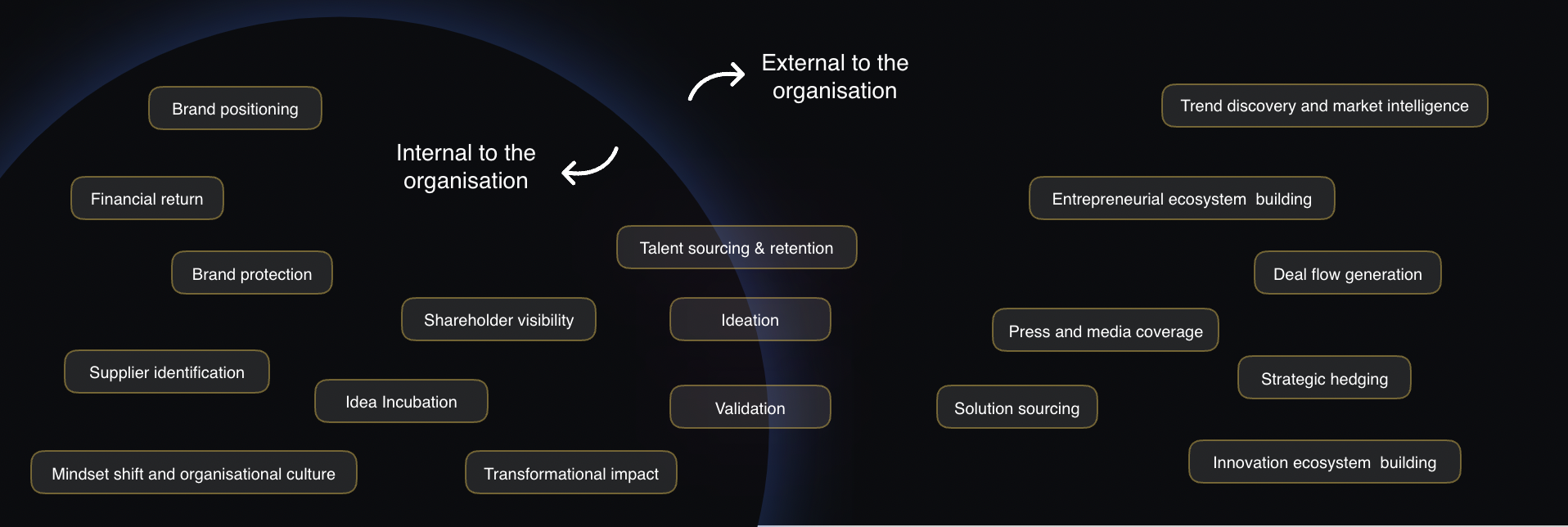
ROI can take various forms, including:
- Financial returns: e.g. increased revenue, reduced costs, or improved profitability.
- Strategic returns: e.g. access to new markets, technologies, or talent.
- Innovation returns: e.g. access to disruptive technologies, VPs, or business models.
- Brand returns: e.g. brand perception, industry recognition, or thought leadership.
- Social and environmental returns: e.g. social or ethical initiatives that further your corporate social responsibility (CSR) goals.
Determine the type(s) of ROI you'll pursue, ensuring they align with your selected value spaces and overall corporate strategy.
Step 3. Define what you expect from startup partners
Startups can bring a variety of benefits to the table and knowing the type of benefits to look for will boost the chances of a successful collaboration. Here are just some of the possibilities you might want to consider:
- Turnkey solutions: Solutions that enhance your organisation's offerings, business processes, or operations.
- Co-creation: Opportunities to jointly test and develop solutions that address your organisation's specific challenges.
- On-demand representation: Allow startups to represent your organisation on demand, showcasing your commitment to innovation and openness.
- Partnerships: Strategic alliances to address key market or industry challenges.
- Pilot projects: Collaborate on the development of a prototype that applies the startup’s technology within your organisation, enabling you to test and validate its potential impact.
Defining your expectations will enable you to create a clear roadmap, helping to ensure that the collaboration yields the desired results.
Step 4. Define the range of the engagement
To optimise the effectiveness of your corporate-startup collaboration, it's essential to determine the scope of the engagement. This involves deciding how close or far the collaboration should extend from your current markets and offerings. In general, collaborations can be categorised into three types of innovation: core, adjacent, and radical.
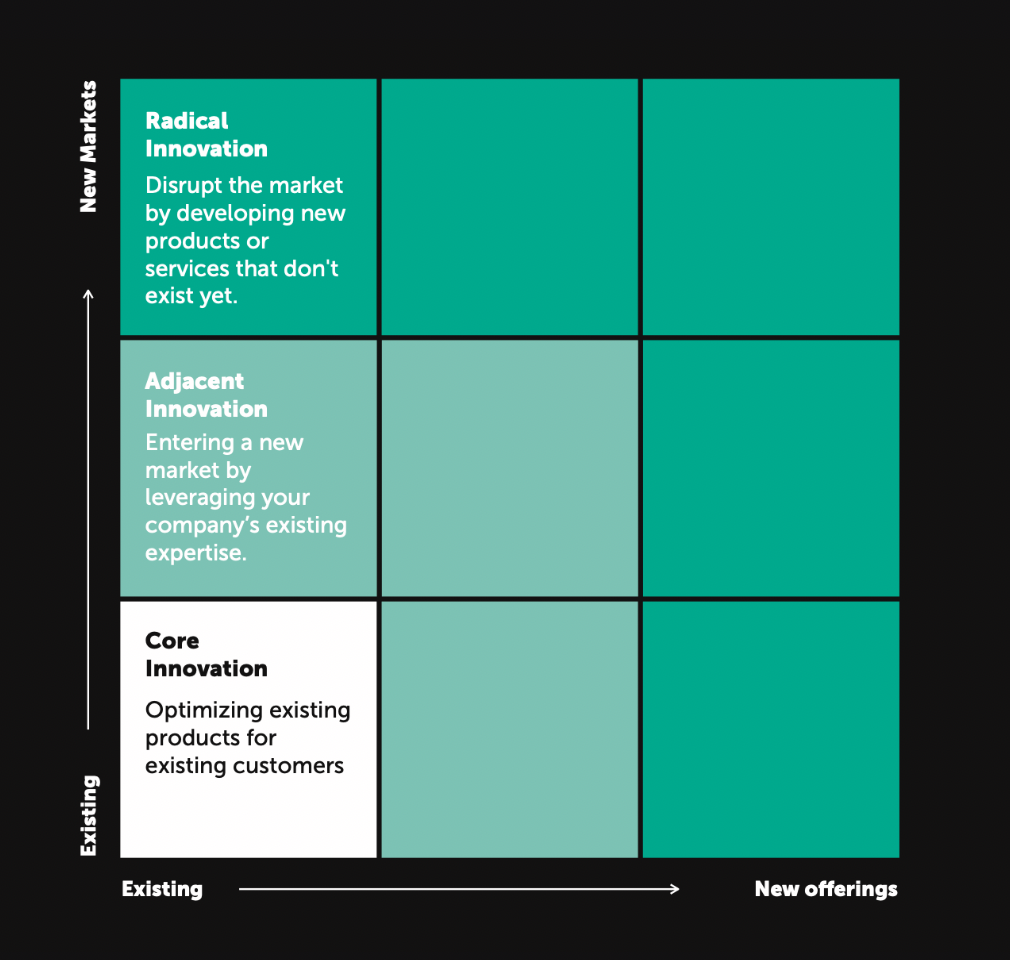
A clearly defined range of your engagement ensures that the collaboration aligns with your business goals and risk appetite, increasing your chances for a successful partnership.
Step 5. Choose your venture vehicle(s)
Now that you have a better understanding of your objectives, expectations, and the scope of your corporate-startup collaboration, you're ready to select the venture vehicle(s) that best align(s) with your vision and goals. Start by identifying your corporation’s higher-level objectives (i.e. the goals you want to reach) using the handy corporate objectives chart below:
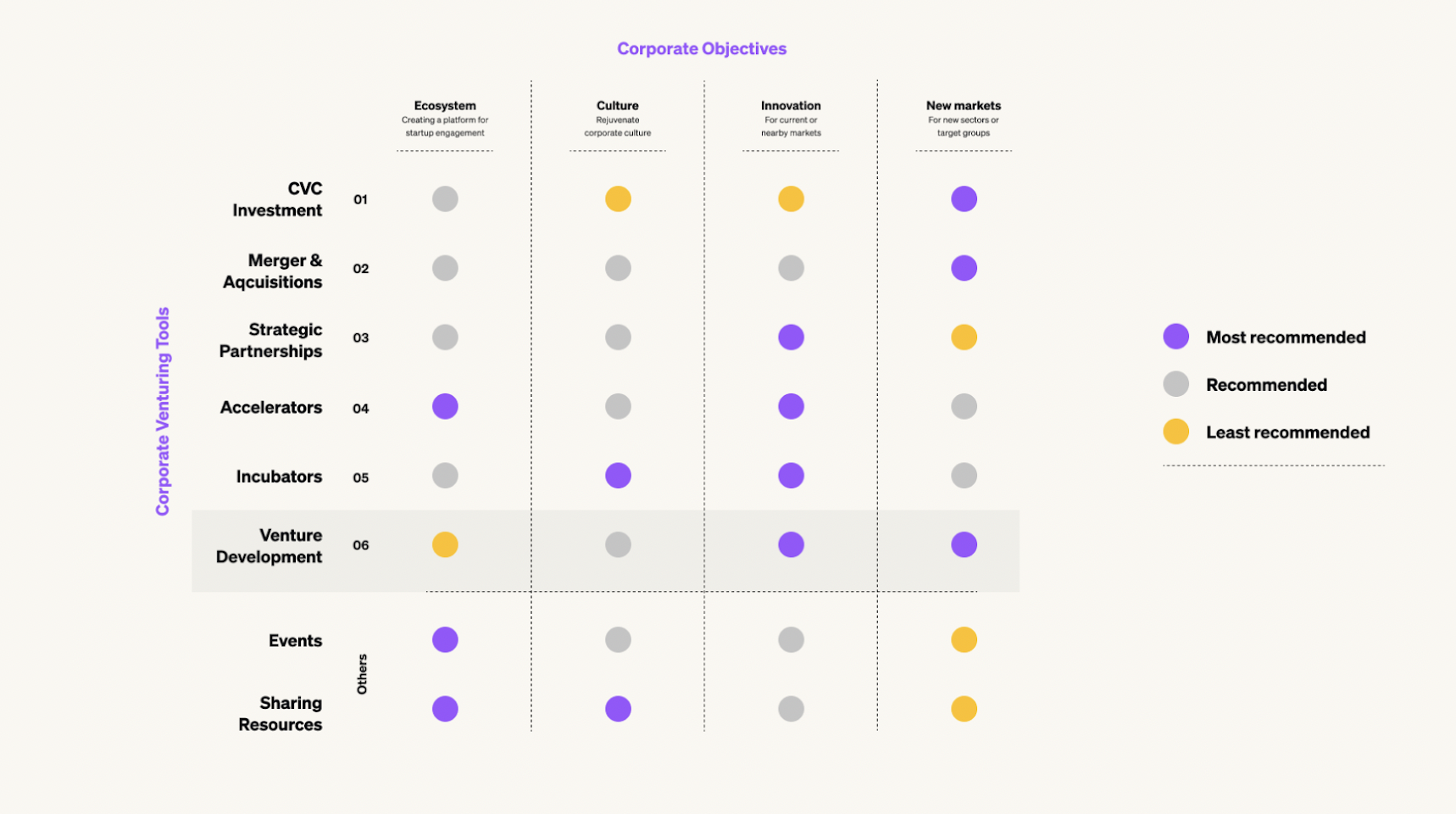
Once you’ve done that, you can use the guide below to find out which approach would be most effective in helping you reach your specific objectives:
Ecosystem
Companies seeking to build or expand their ecosystem need tools that can create an effective platform for startup engagement. Good options include accelerators, events, and sharing resources models.
Culture
If your goal is to boost an entrepreneurial mindset within your company, you’ll need an approach that helps rejuvenate your corporate culture. Good choices include incubation and sharing resources models.
Innovation
If your main objective is to reach adjacent markets with modest change, use tools suited for incremental innovation, like accelerator, incubator, and venture development studio models.
New markets
If your goal is to venture outside your core business, stick with models aimed at seeking out new sectors or target groups, like CVC, M&A, and venture development studios.
For more information on specific innovation models, check out our innovation archetypes article.
Step 6: Determine what will make a collaboration with you unique
To attract the cutting-edge startups you're seeking, it's essential to identify the unique assets and capabilities that set you apart from the competition (i.e. other corporates). This will make it easier for you to showcase the value and benefits that startups can gain by collaborating with you. Here are just a few examples of potential corporate assets you can leverage:
- Funding
- Industry expertise
- Networks and partnerships
- Talent
- Infrastructure
- Customer base
Step 7: Establish your key criteria for startup selection
When choosing startups to collaborate with, it's helpful to have clear criteria that align with your corporation's objectives and goals. Some of the factors to consider when deciding the criteria to use, include:
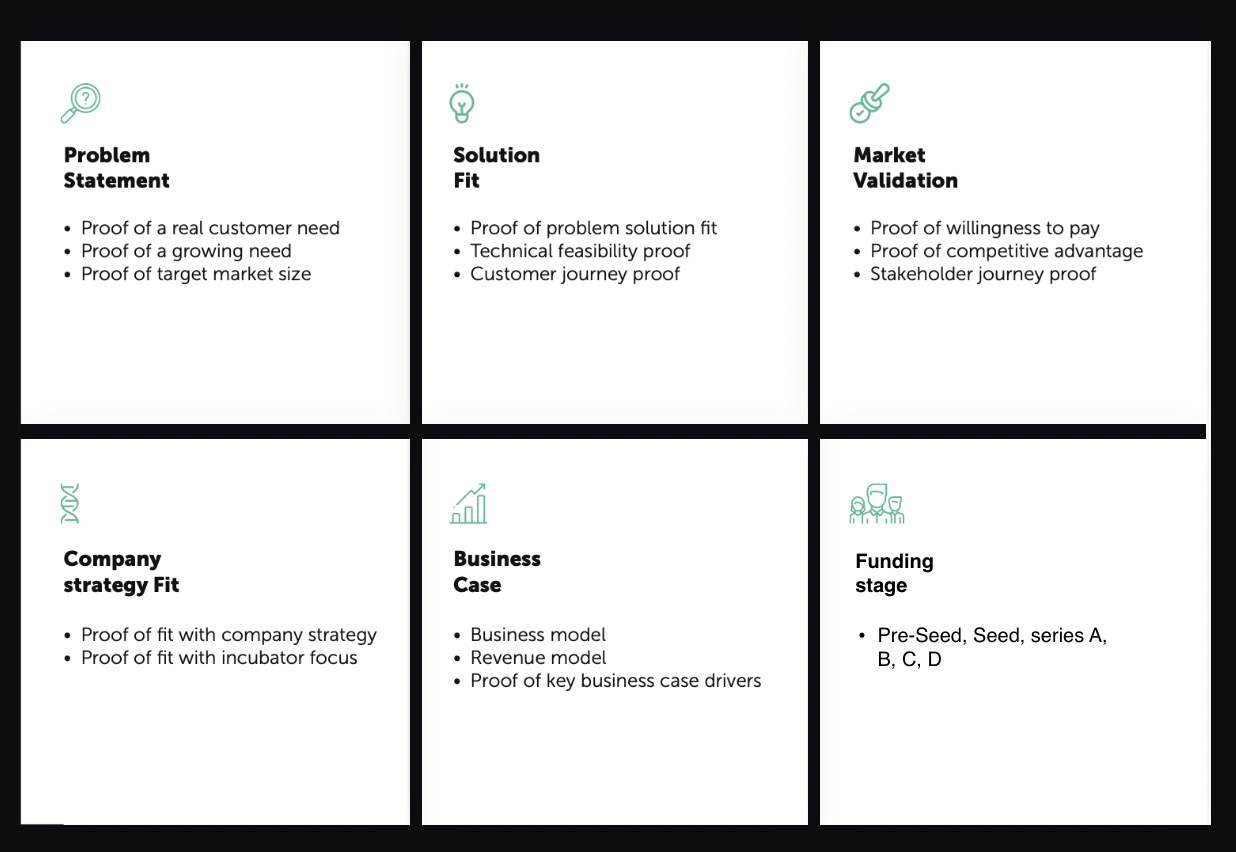
Carefully considering these factors will insure you’re better equipped to select startups with the potential to drive successful outcomes and achieve lasting impact.
Step 8: Allocate your resources wisely
Successful collaborations require more than just funding; they need a thoughtful allocation of resources to thrive. Here are a few examples of factors to consider during the resource allocation process:
- Department involvement: Identify which departments need to be involved (e.g., legal, IT, marketing, etc.) and ensure they’re equipped to support the collaboration.
- Financial resources: Define your monetary resources and allocate them where they can make the most impact.
- Office space and equipment: Evaluate the physical resources needed, like office space and equipment - to facilitate successful outcomes.
- Additional resources: What other resources will you need (e.g. networks, advisory boards)?
- Strategic partnerships: Identify potential strategic partners that can contribute to the success of the collaboration.
Ensure that the resources are proportional to the expected outcomes and continuously monitor and adjust them as the collaboration evolves.
Step 9: Get corporate leadership and stakeholders onboard
Engaging corporate leadership and stakeholders from the beginning is essential for the success of any collaboration. Position your collaboration vehicle close to the executive level, making it easier to gain buy-in, streamline processes, and expedite decision-making.
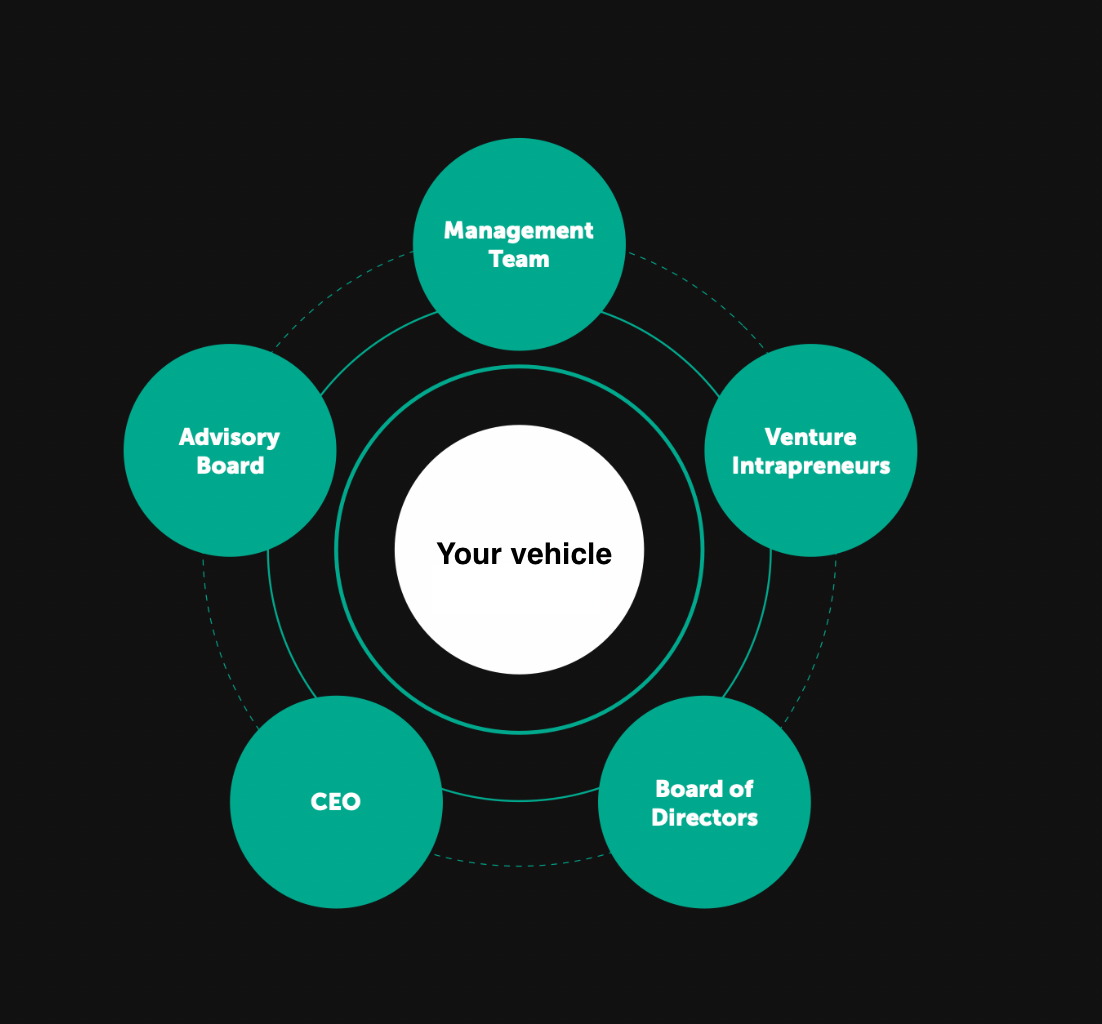
Remember, no matter how much potential your collaborations have, without the right positioning and internal support, they run the risk of being delayed or even phased out. Stay ahead of this challenge by keeping corporate leadership in the loop, securing their support and addressing any concerns that may arise.
Step 10: Set a clear timeline with tangible milestones
Develop a comprehensive plan for your collaboration, outlining the duration, process flows, milestones, and deliverables. Break down the project into smaller, manageable tasks and assign deadlines for each milestone.
This structured approach will keep everyone on track and ensure that expectations are clear.
Step 11: Plan past the initial collaboration phase
Decide on what happens when the collaboration reaches its initial goal. Consider the various scenarios, like continuing the partnership long-term, integrating the startup into your organisation, or spinning it off as a separate business.
FAQs about corporate-startup collaboration
Q. How do corporations choose the right startups to partner with?
Corporations select startups based on strategic alignment, growth potential, innovation capability, and cultural fit.
Q. What are the key factors for a successful corporate-startup collaboration?
Successful collaborations depend on clear objectives, cultural alignment, leadership support, well-defined engagement models, and mutual value creation. Setting clear KPIs and maintaining flexibility are also critical.
Q. What collaboration models are most effective for corporate-startup partnerships?
Effective models include accelerators, venture client units, corporate venture capital, sandboxing, and hybrid innovation hubs. The right model depends on the company’s strategic objectives and innovation priorities.
Q. How do corporations measure the ROI of startup collaborations?
Corporations measure ROI through financial returns (e.g., revenue growth), strategic gains (e.g., market access, technology integration), innovation outcomes (e.g., new product launches), and brand or cultural impact.
Q. What challenges do corporations face when working with startups?
Common challenges include speed and process mismatches, cultural differences, IP ownership issues, internal resistance to change, and difficulty integrating startup innovations into the corporate structure.
Q. How long does it take to see results from a corporate-startup collaboration?
Timelines vary depending on the collaboration model and objectives. Some accelerators deliver results in 6–12 months, while strategic partnerships or CVC-backed initiatives may take 2–5 years to show full impact.
Final thoughts
When done right, corporate-startup collaborations can unlock unprecedented growth quickly and with a reduced level of risk. They’re especially useful for companies that are having trouble navigating today’s uncertain landscape or competing due to rapidly changing technologies, outdated business models or the arrival of new players in the market.
For more tips on how to establish successful corporate startup collaborations, be sure to check our BVC roundtable recap: How Can I Help Startups Work Within the Corporate Environment?
---
Want to set up your own corporate-startup collaborations? We can help you build a customised venture partnering strategy that leverages your existing assets to unlock new growth opportunities.
11 Key Steps for Successful Startup Partnerships
How to forge startup partnerships that tap into disruptive ideas and innovative business models.








